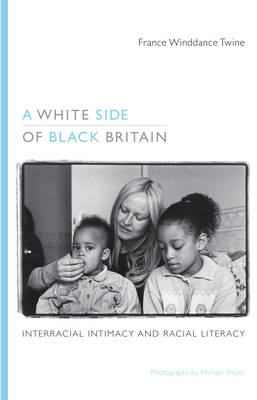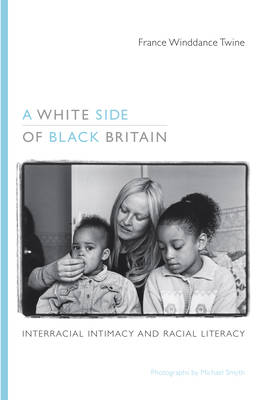
- Afhalen na 1 uur in een winkel met voorraad
- Gratis thuislevering in België vanaf € 30
- Ruim aanbod met 7 miljoen producten
- Afhalen na 1 uur in een winkel met voorraad
- Gratis thuislevering in België vanaf € 30
- Ruim aanbod met 7 miljoen producten
Zoeken
A White Side of Black Britain
Interracial Intimacy and Racial Literacy
France Winddance Twine
Paperback | Engels
€ 53,45
+ 106 punten
Omschrijving
A White Side of Black Britain explores the racial consciousness of white women who have established families and had children with black men of African Caribbean heritage in the United Kingdom. Filling a gap in the sociological literature on racism and antiracism, France Winddance Twine introduces new theoretical concepts in her description and analysis of white "transracial" mothers raising their children of African Caribbean ancestry in a racially diverse British city. Varying in age, income, education, and marital status, the transracial mothers at the center of Twine's ethnography share moving stories about how they cope with racism and teach their children to identify and respond to it. They also discuss how and why their thinking about race, racism, and whiteness changed over time. Interviewing and observing more than forty multiracial families over a decade, Twine discovered that in most of them, the white woman's racial consciousness and her ability to recognize and negotiate racism were derived as much from her relationships with her black partner and his extended family as from her female friends. In addition to the white birth mothers, Twine interviewed their children, spouses, domestic partners, friends, and members of their extended families. Her book is best characterized as an ethnography of racial consciousness and a dialogue between black and white family members about the meaning of race, racism, and whiteness. It includes intimate photographs of the family members and their communities.
Specificaties
Betrokkenen
- Auteur(s):
- Uitgeverij:
Inhoud
- Aantal bladzijden:
- 328
- Taal:
- Engels
Eigenschappen
- Productcode (EAN):
- 9780822348764
- Verschijningsdatum:
- 8/02/2011
- Uitvoering:
- Paperback
- Formaat:
- Trade paperback (VS)
- Afmetingen:
- 156 mm x 235 mm
- Gewicht:
- 630 g

Alleen bij Standaard Boekhandel
+ 106 punten op je klantenkaart van Standaard Boekhandel
Beoordelingen
We publiceren alleen reviews die voldoen aan de voorwaarden voor reviews. Bekijk onze voorwaarden voor reviews.








